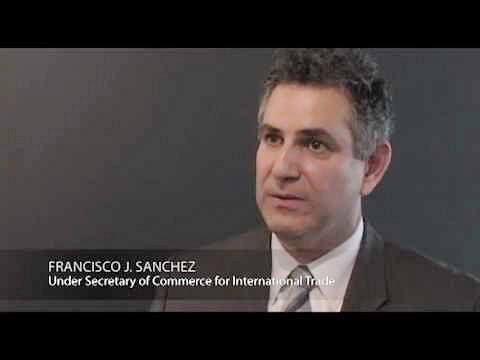
Francisco Sánchez speaks to People's Daily Online Biz Channel (PDO Biz)
The Elite Talk program by Li Zhenyu from the PDO BizRelated:
New possibilities for China-US economic cooperation 
For the China-US economic relationships, two-way investment plays an increasingly important role in advancing the commercial ties. China and the US have initiated substantive talks on a Bilateral Investment Treaty (BIT), which would greatly boost two-way direct investment between the world's top two trading powers.
The BIT, once signed, could open a new chapter for the China-US bilateral economic cooperation, as it would allow US companies greater access to the Chinese market while assuring a fair treatment of the growing Chinese investment in the US.
Although China and the US have both made their commitment to substantive negotiations on the BIT, no specific timetable has been given; and some entrepreneurs recently called for the BIT negotiations to be resumed.
For the latest info on the BIT talks, I checked with Mr. Francisco Sánchez. He is the current Undersecretary for International Trade at the US Department of Commerce. Here's our talk.
TranscriptHost: Some Chinese and American business leaders recently called for resuming negotiations on the China-US Bilateral Investment Treaty (BIT). Anything new on that negotiation?
Sánchez: You know, that's managed by the Office of the US Trade Representative, and I don't have any new information as to where that is. I know there is a lot of interest on the Bilateral Investment Treaty by both the United States and China, and so I know we will continue to engage on that issue but I don't have any new information in terms of timing.
What I can say is that there are many things that we can do to encourage trade and investment in our respective countries, and a Bilateral Investment Treaty is one of those, but I also think we need to spend time on other things like specific barriers to trade and barriers to investment, and find ways to reduce those barriers for our mutual interests.
Host: Talking about reducing trade barriers, the US has been actively pushing forward a free trade initiative – the Trans Pacific Partnership (TPP) across the Asia-Pacific region. It is now in the final stages of negotiations. Anything new on the horizon for that negotiation?
Sánchez: I am very excited about the TPP. It is an effort by now 12 countries that touch on the Pacific to create a 21st century, high-standard trade agreement. And I think not only will it benefit those 12 countries, but it will help become a precedent for trade generally.

 Chinese Kung Fu charms Silicon Valley
Chinese Kung Fu charms Silicon Valley
 Tranquil Yankou ancient town
Tranquil Yankou ancient town
 Lake Geneva: A show of swans
Lake Geneva: A show of swans
 Beautiful sunset over the Irtysh River
Beautiful sunset over the Irtysh River
 Qingjing Mosque: Witness of the ancient Maritime Silk Road
Qingjing Mosque: Witness of the ancient Maritime Silk Road
 Neiliansheng – more than 100 years of fashion
Neiliansheng – more than 100 years of fashion
 Golden retriever feeds baby African lions
Golden retriever feeds baby African lions
 Strange rocks in Lama Mountain
Strange rocks in Lama Mountain
 First overseas "China-standard" electric railway laid
First overseas "China-standard" electric railway laid
 College graduate launches organic agricultural cooperative in hometown
College graduate launches organic agricultural cooperative in hometown



 Opening ceremony of 67th Cannes Film Festival
Opening ceremony of 67th Cannes Film Festival Pulse of Xiamen - Int'l Yoga art festival in May
Pulse of Xiamen - Int'l Yoga art festival in May Photo story: Life of a scrap metal recycle worker
Photo story: Life of a scrap metal recycle worker Training of the PLA's first female honor guard
Training of the PLA's first female honor guard China's 10 must-see animations
China's 10 must-see animations Female bodybuilders show their beauty of fitness
Female bodybuilders show their beauty of fitness A taste of Harbin cuisine
A taste of Harbin cuisine A bite of Jiang Nan
A bite of Jiang Nan Who is China's campus beauty queen?
Who is China's campus beauty queen? 8 great movies to watch with your mom
8 great movies to watch with your mom China's most luminous celebrities
China's most luminous celebrities Newly recruited police in Hetian hold drill
Newly recruited police in Hetian hold drill  Bird-men compete flying in Hong Kong
Bird-men compete flying in Hong Kong  The 'Chinese Dad'
The 'Chinese Dad' Shanghai locals bid farewell to childhood memories
Shanghai locals bid farewell to childhood memories